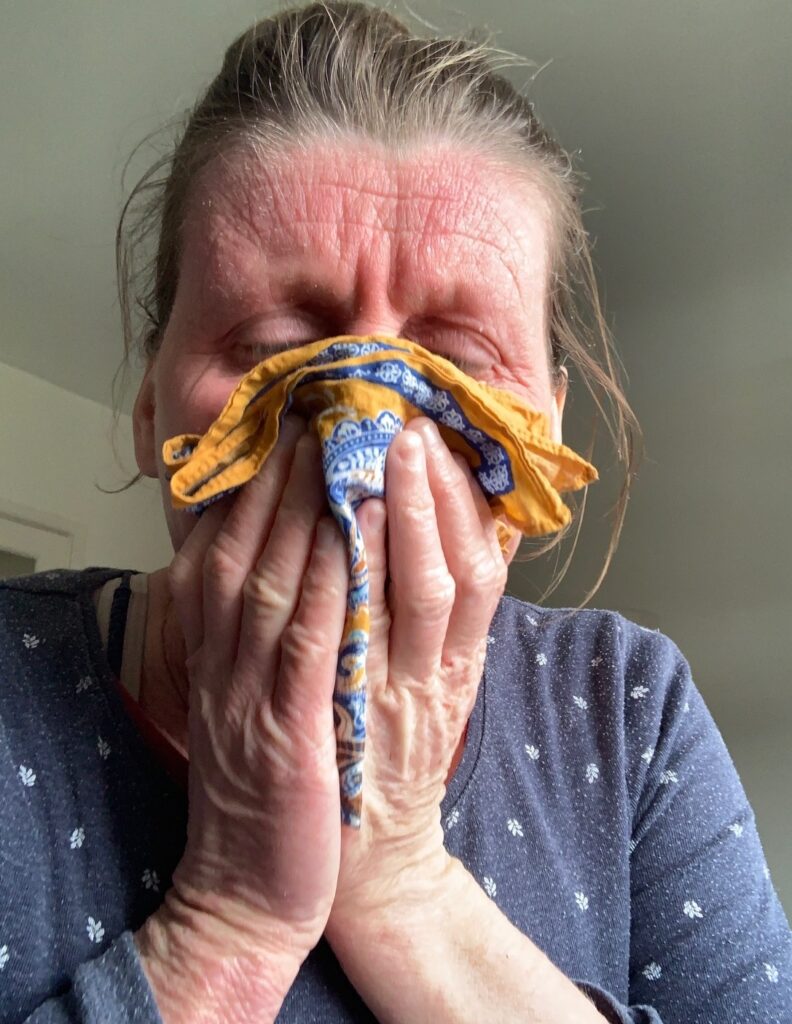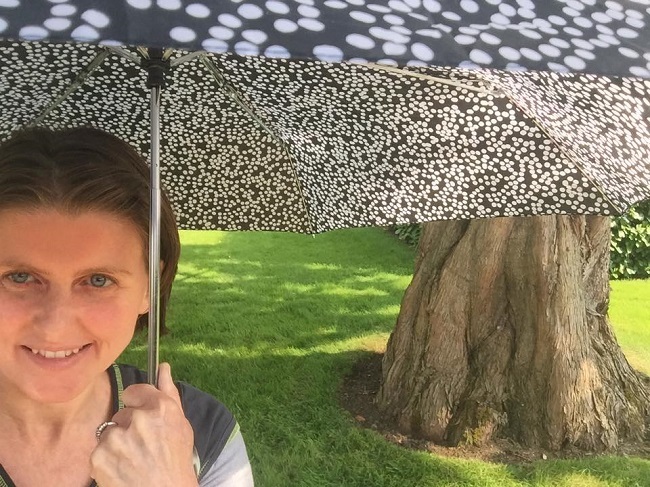As part of Spring Allergy Week this news seemed very relevant. The number of people with hay fever in the UK has almost doubled! Why is this? Mine has certainly been worse with streaming eyes, wheezing, sneezing and itchy skin.
Here’s the stats:
- Half (49%) of UK population report suffering from hay fever symptoms, almost double previous estimates
- More than a third (37%) have developed symptoms for the first time in the last five years
- Over half (56%) are anxious that others may mistake their symptoms for signs of Covid-19
- Evidence that warmer temperatures and increasing pollution are contributing to a longer UK pollen season
A new study by leading national charity Allergy UK in partnership with Kleenex has revealed that nearly half (49%) of the UK population now suffer from hay fever, almost double the number previously thought.
Hay fever – otherwise known as Seasonal Allergic Rhinitis – was formerly estimated to affect somewhere between 10 and 13 million people in the UK, or 20-30% of the population.
But a poll of over 7000 respondents suggests there has been a significant increase in the number of those with the allergy, as more than a third (37%) said they had developed symptoms for the first time in the last five years. The research has been released to mark the start of Allergy UK’s 2021 Allergy Awareness Week (26-30 April).

With the pollen season running from March-September in the UK, the lifting of lockdown restrictions comes at a potentially difficult time for the increasing number of hay fever sufferers.
Over a third (35%) with the allergy are concerned about spending more time outside as restrictions are lifted, while 32% said their excitement about lockdown lifting has dampened because it is happening during peak pollen season. Meanwhile, over half (56%) are anxious that others may mistake their hay fever symptoms for signs of Covid-19.
The recent rise in people experiencing hay fever may be closely linked to rising temperatures in the UK according to Allergy UK, the leading national charity for people living with allergic conditions.
Amena Warner, Head of Clinical Services at Allergy UK, said: “There is evidence that suggests that climate change, with increasing temperatures may contribute to extending the grass pollen season in the UK. Grass pollen is the cause of the majority of pollen driven hay fever symptoms. Furthermore, with warmer weather, pollen counts can be high, and breeze can spread pollen over a large area as it is carried in the wind.
“Human activities have increased atmospheric concentrations of carbon dioxide (CO2) and other greenhouse gases. Studies are showing that plants produce more pollen as a response to high atmospheric levels of carbon dioxide (CO2), and so people may also find that their hay fever is worse when pollution levels are high, especially in warm weather.
“These are the factors that lead us to expect rising pollen levels in the UK in the coming years, triggering the unpleasant symptoms of hay fever over longer periods”.
The study has also revealed the negative impact of hay fever on people’s quality of life. Nearly two thirds (64%) reported tiredness due to poor sleep quality, while a third (34%) have skipped social engagements due to symptoms.
Workers said that hay fever affects their concentration (46%) and lowers their productivity (35%), whilst a third of sufferers (34%) have reported experiencing embarrassment and anxiety (30%) due to their symptoms. Despite this, 44% have never discussed their hay fever with a healthcare professional.
Hay fever can also discourage people from adopting an active lifestyle. Almost half (49%) of sufferers spend less time exercising outside because of symptoms, while almost a third (30%) have reported weight gain and becoming unfit as a result of not exercising outside.
Amena Warner, Head of Clinical Services at Allergy UK, continued: “Hay fever can sometimes be trivialised, but this research illustrates its real impact on the millions of people across the UK who experience it each year. We know that anxiety about the condition has become worse during the pandemic and we urge anyone who is suffering in silence to speak to a pharmacist or healthcare professional to help find treatments that work for them”
“This year’s Allergy Awareness Week is focused on hay fever, and with support from Kleenex, we have developed more resources to help people manage their symptoms and reduce the impact on day-to-day life at this difficult time”.
Ori Ben Shai, Vice President and Managing Director, Kimberly-Clark UK, said: “We know how unpleasant hay fever can be and this research highlights the issues that millions of people will be facing as we approach peak pollen season. Kleenex is determined to support the UK’s hay fever sufferers and our partnership with Allergy UK will provide them with a range of tools and content to help them manage their symptoms across Allergy Awareness Week and beyond.”
For further advice, you can call the Allergy UK Helpline on 01322 619 898.
How is your Hay fever this year?
Do you think you’re getting it for the first time or is yours worsening? In March and April it’s the tree pollen and that always gets me but I’m getting by without any medication. I’ve been worried about the continued use of antihistamines on my health. Anyone else worry about that?












Fascinating, thanks Ruth. Re antihistamines, I had a sudden epiphany moment recently. I realised I’d been taking fexofenadine (Telfast) for years throughout spring and summer, then around 40, my hayfever got a lot better so I stopped. I realised when I did a timeline recently that my severe food reactivity started not long after that – coincidence? I think not. Fexofenadine is regularly the antihistamine of choice for MCAS (mast cell activation disorder) sufferers, so I am reckoning it had held my histamine and MCAS tendencies at bay and when I stopped, all hell let loose! I am looking at reintroducing meds whilst I try and get more natural antihistamines like quercetin and Vit C in underneath them, can’t tolerate supplements yet. Sadly, though, most antihistamines have allergens like lactose and maize starch in them – go figure! Anyway, thought I’d chime in with an experience of antihistamines for you!
Whilst I’m here, I’ve written tons on natural approaches for hayfever on my blog if anyone needs some ideas. https://purehealthclinic.co.uk/?s=hayfever. Mine is minimal now – too busy reacting to food, but when I do get it, I use a little allergy reliever thing from Lloyds, which works a treat.
Thank you Micki, gosh that is fascinating! So you can help the body produce natural antihistamine? I’ll definitely be checking your hay fever tips. Eyes streaming today. Do you have MCAS? That’s such a complex one. I stopped taking the antihistamines as I realised I was becoming immune to them and wanted them to have a fighting chance of helping me should I go into anaphylaxis. I am coping but some days the hay fever is pretty full on. Lovely to hear from you x
Yes, you certainly can help produce your own anti histamine and help lower it down. I wrote the Histamine Factsheet to show people how https://purehealthclinic.co.uk/histamine-intolerance/ and here’s my hay-fever factsheet too https://purehealthclinic.co.uk/hayfever/ x
That’s brilliant! I really need to gen up on this! Thanks so much for all you do.
I am in the states and I was definitely a late bloomer with this whole allergy thing. I have tried it all. Even going with allergy shots, they didn’t seem to do anything but give me sore arms, lol. I am allergic to mold, weeds, trees, dust mites and cocker roach dander. It’s been frustrating because with my allergies came the sinusitis. I too have tried to lay off antihistamine and other over the counter medications. Going more with nasal washes. But still nothing has given me any long term relief. While growing up I saw people who suffered from allergies and did not know the extent of it now I do,lol. WOW!!
It’s tough isn’t it. I share some links to other resources below. Not much seems to work for me either and I don’t want to reliant on medication. I might try saline washes as I’ve heard good things about them. But I have also bought a wide brimmed hat so hope to just keep the stuff off me when I’m out! ha ha! I’m allergic to trees, weeds, moulds,, grass and dust too it’s pretty much year round! For me it’s mostly watery eyes so it’s not bothering me so much. It’s worse at the moment though with tree pollen, very sore eyes this month. Oh how I love Spring in England. Thanks so much for your comment.